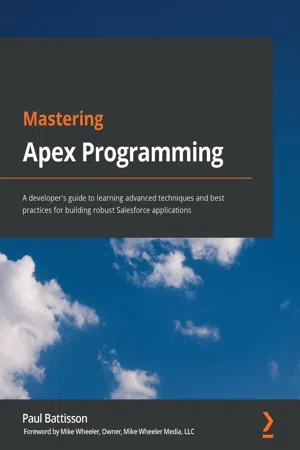
Mastering Apex Programming
A developer's guide to learning advanced techniques and best practices for building robust Salesforce applications
- 368 pages
- English
- ePUB (mobile friendly)
- Available on iOS & Android
Mastering Apex Programming
A developer's guide to learning advanced techniques and best practices for building robust Salesforce applications
About this book
Get to grips with the advanced features of Apex programming for Salesforce developers using this comprehensive guide
Key Features
- Discover how to build reliable applications with Apex by avoiding common mistakes and pitfalls
- Learn how to use the different asynchronous programming tools in Apex
- Profile and improve the performance of your Apex code
Book Description
As applications built on the Salesforce platform are now a key part of many organizations, developers are shifting focus to Apex, Salesforce's proprietary programming language. As a Salesforce developer, it is important to understand the range of tools at your disposal, how and when to use them, and best practices for working with Apex. Mastering Apex Programming will help you explore the advanced features of Apex programming and guide you in delivering robust solutions that scale.
This book starts by taking you through common Apex mistakes, debugging, exception handling, and testing. You'll then discover different asynchronous Apex programming options and develop custom Apex REST web services. The book shows you how to define and utilize Batch Apex, Queueable Apex, and Scheduled Apex using common scenarios before teaching you how to define, publish, and consume platform events and RESTful endpoints with Apex. Finally, you'll learn how to profile and improve the performance of your Apex application, including architecture trade-offs.
With code examples used to facilitate discussion throughout, by the end of the book, you'll have developed the skills needed to build robust and scalable applications in Apex.
What you will learn
- Understand common coding mistakes in Apex and how to avoid them using best practices
- Find out how to debug a Salesforce Apex application effectively
- Explore different asynchronous Apex options and their common use cases
- Discover tips to work effectively with platform events
- Develop custom Apex REST services to allow inbound integrations
- Build complex logic and processes on the Salesforce platform
Who this book is for
This book is for Salesforce developers who are interested in mastering Apex programming skills. You'll also find this book helpful if you're an experienced Java or C# developer looking to switch to Apex programming for developing apps on the Salesforce platform. Basic Apex programming knowledge is essential to understand the concepts covered.
Tools to learn more effectively

Saving Books

Keyword Search

Annotating Text

Listen to it instead
Information
Section 1 – Triggers, Testing, and Security
- Chapter 1, Common Apex Mistakes
- Chapter 2, Debugging Apex
- Chapter 3, Triggers and Managing Trigger Execution
- Chapter 4, Exceptions and Exception Handling
- Chapter 5, Testing Apex Code
- Chapter 6, Secure Apex Programming
Chapter 1: Common Apex Mistakes
- Null pointer exceptions
- Bulkification of Apex code to avoid Governor Limits
- Hardcoding references to specific object instances
- Patterns to deal with managing data across a transaction
Technical Requirements
Null pointer exceptions
Exceptions on object instances
Table of contents
- Mastering Apex Programming
- Why subscribe?
- Preface
- Section 1 – Triggers, Testing, and Security
- Chapter 1: Common Apex Mistakes
- Chapter 2: Debugging Apex
- Chapter 3: Triggers and Managing Trigger Execution
- Chapter 4: Exceptions and Exception Handling
- Chapter 5: Testing Apex Code
- Chapter 6: Secure Apex Programming
- Section 2 – Asynchronous Apex and Apex REST
- Chapter 7: Utilizing Future Methods
- Chapter 8: Working with Batch Apex
- Chapter 9: Working with Queueable Apex
- Chapter 10: Scheduling Apex Jobs
- Chapter 11: Using Platform Events
- Chapter 12: Apex REST and Custom Web Services
- Section 3 – Apex Performance
- Chapter 13: Performance and the Salesforce Governor Limits
- Chapter 14: Performance Profiling
- Chapter 15: Improving Apex Performance
- Chapter 16: Performance and Application Architectures
- Other Books You May Enjoy
Frequently asked questions
- Essential is ideal for learners and professionals who enjoy exploring a wide range of subjects. Access the Essential Library with 800,000+ trusted titles and best-sellers across business, personal growth, and the humanities. Includes unlimited reading time and Standard Read Aloud voice.
- Complete: Perfect for advanced learners and researchers needing full, unrestricted access. Unlock 1.4M+ books across hundreds of subjects, including academic and specialized titles. The Complete Plan also includes advanced features like Premium Read Aloud and Research Assistant.
Please note we cannot support devices running on iOS 13 and Android 7 or earlier. Learn more about using the app